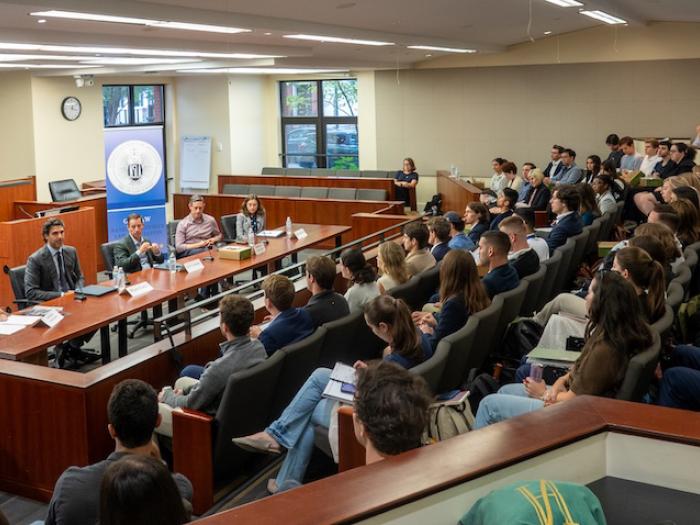"Families of men killed in boat strikes sue Trump administration.”
The Washington Post quoted Laura Dickinson on this lawsuit’s potential impact on national security.


The George Washington University Law School’s National Security, Cybersecurity, and Foreign Relations Law program stands at the forefront of legal education in one of the most dynamic and high-stakes fields of law. With unparalleled breadth and depth, the program offers rigorous training on both foundational and emerging issues—from the laws of armed conflict and intelligence oversight to cutting-edge challenges in cybersecurity, surveillance, and technology policy.
Taught by a distinguished faculty of nationally recognized experts and practitioners, students benefit from deep academic insight and real-world experience. The program also boasts a strong track record of alumni success in securing positions across the national security community, including government agencies and private sector roles. Notably, GW Law’s National Security & Cybersecurity LLM program was recently ranked number one in the nation by Cybersecurity Guide, reflecting its leadership and excellence in preparing the next generation of legal professionals to navigate the evolving landscape of national security and technology.
This practice area explores the nature and origins of the federal government's foreign relations powers, and U.S. law implementing international law, and the U.S. law of national security and counterterrorism.
This practice area has evolved with the world's increased connectivity through the use of modern technology and cyberspace and the accompanying growing vulnerabilities from physical and cyber threats.
Learn more about our diverse and experienced National Security, Cybersecurity, and Foreign Relations Law faculty.

GW Law National Security Program Releases Spring 2026 Newsletter
February 12, 2026
The GW Law National Security, Cybersecurity, and Foreign Relations Law program recaps the Fall 2025 semester in its latest newsletter.

GW Law Hosts Panel on US Intervention in Venezuela
January 26, 2026
The GW Law International & Comparative Law Program partnered with the National Security, Cybersecurity & Foreign Relations Law Program to host the panel.

GW Law to Host 2026 Schenck National Security Crisis Negotiation Competition
January 23, 2026
The competition provides first-year law students with an opportunity to develop critical negotiation skills in a high-stakes national security environment.
National Security, Foreign Relations, & Cybersecurity News
The National Security Law Program holds several events throughout the semester. Please check back for new events.
"Families of men killed in boat strikes sue Trump administration.”
The Washington Post quoted Laura Dickinson on this lawsuit’s potential impact on national security.
"Trump Is Threatening to Invoke the Insurrection Act in Minnesota: What to Know”
The Wall Street Journal quoted Laura Dickinson on Trump’s threat to invoke the Insurrection Act.
"Trump administration investigates 5 Democrats over their video to troops”
CBS News quoted Laura Dickinson on the requirement for troops to follow legal orders but not unlawful ones.
"Trump threatened to invoke the Insurrection Act (again). What is it?"
NPR quoted Laura Dickinson on Trump’s threat to invoke the Insurrection Act.
